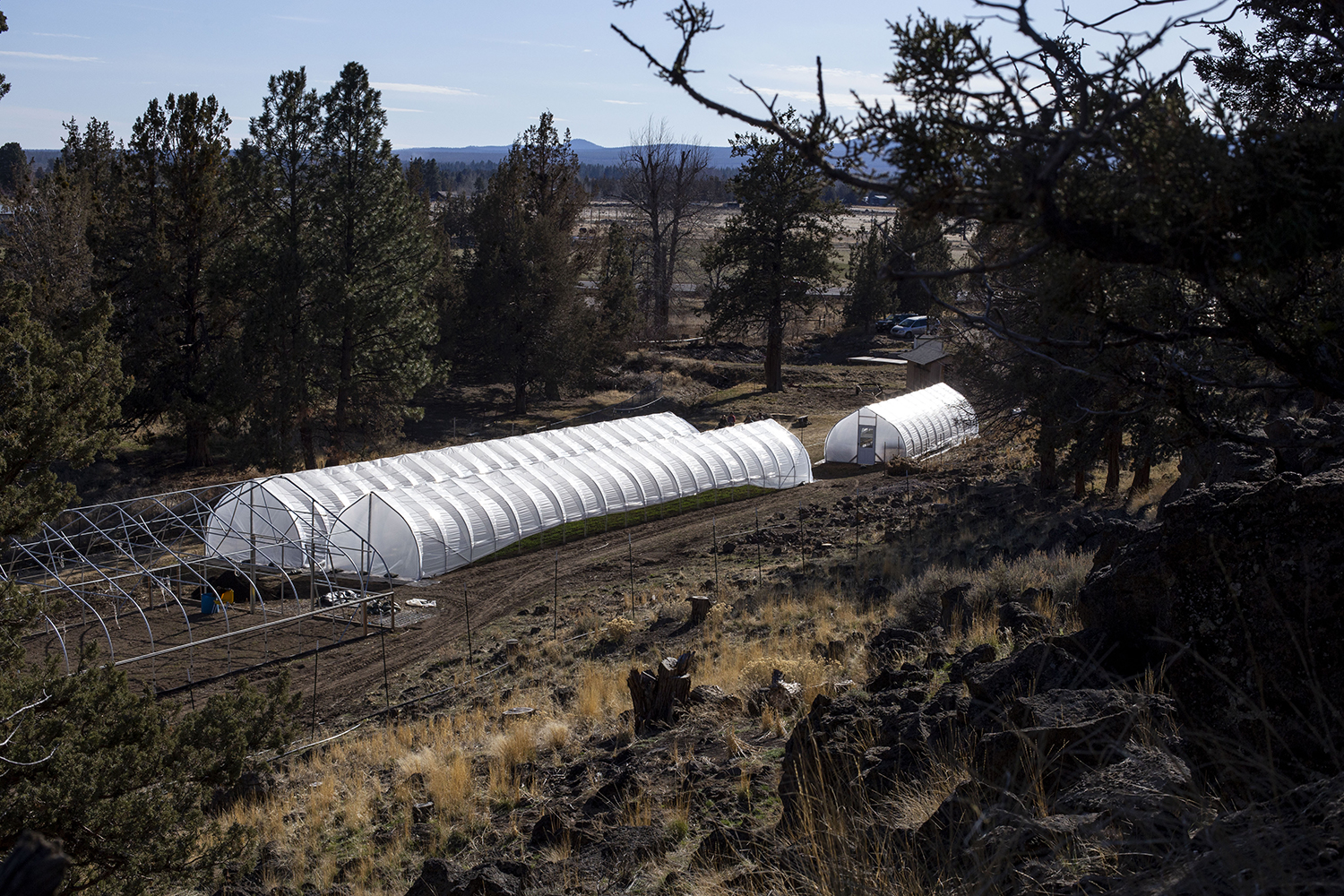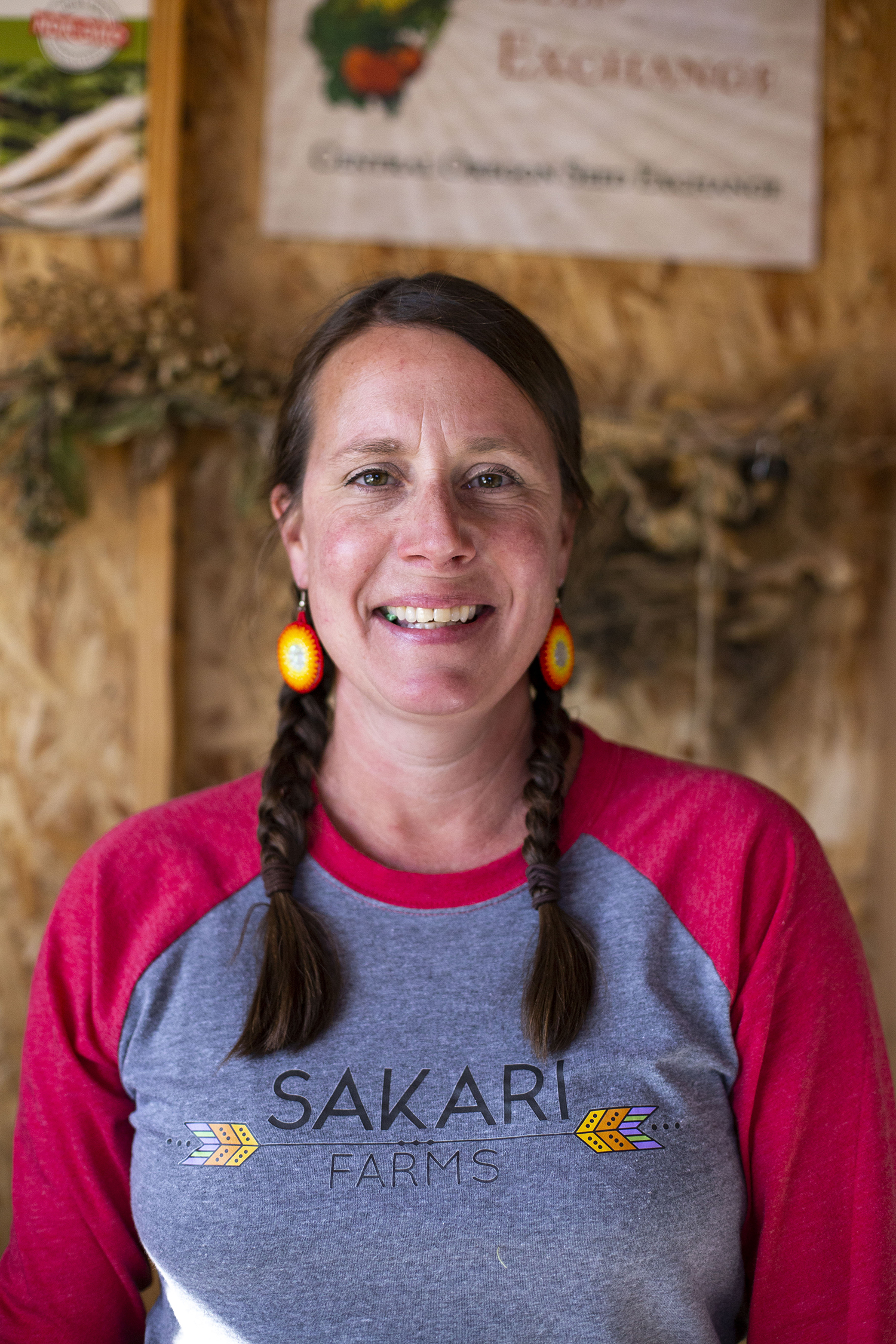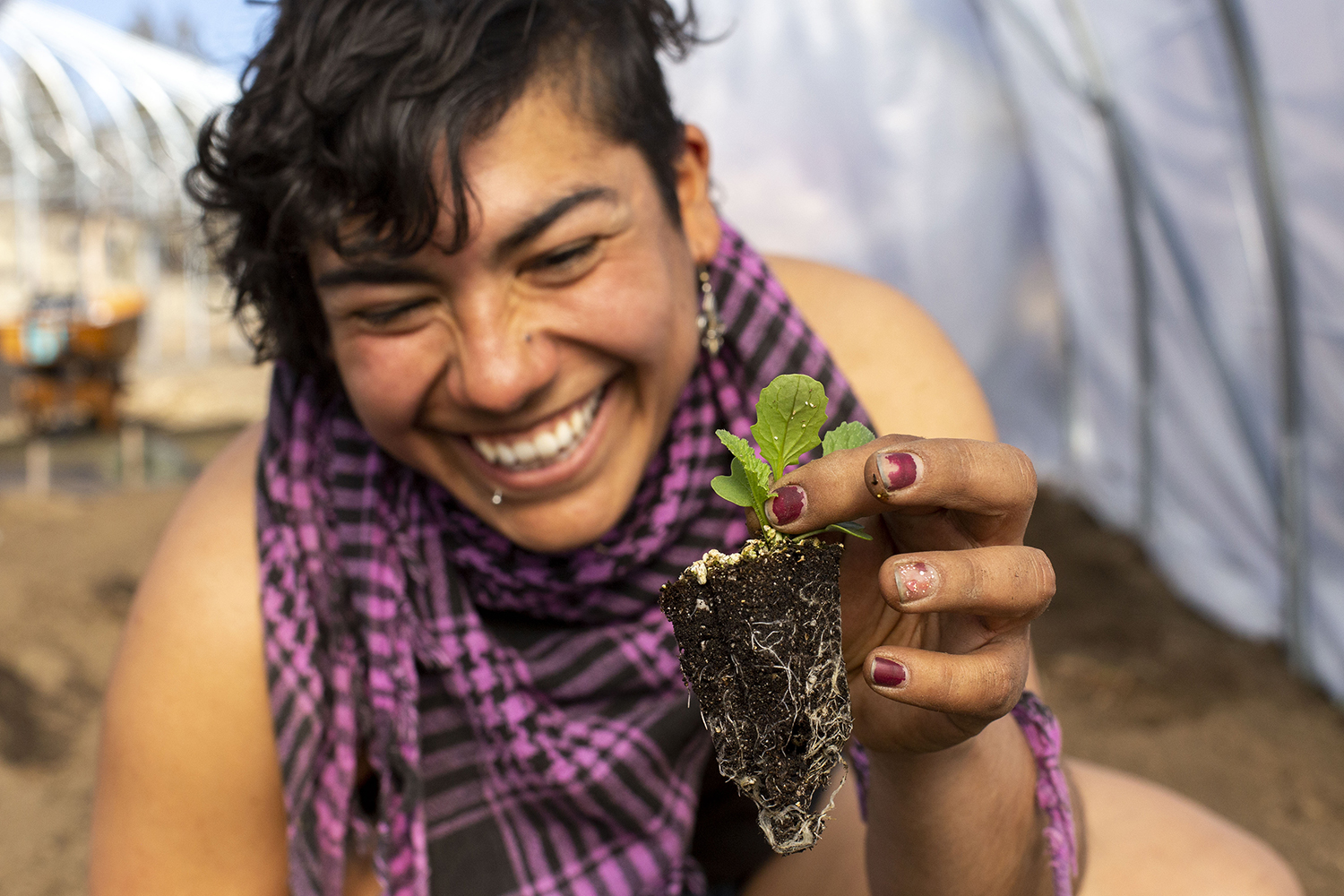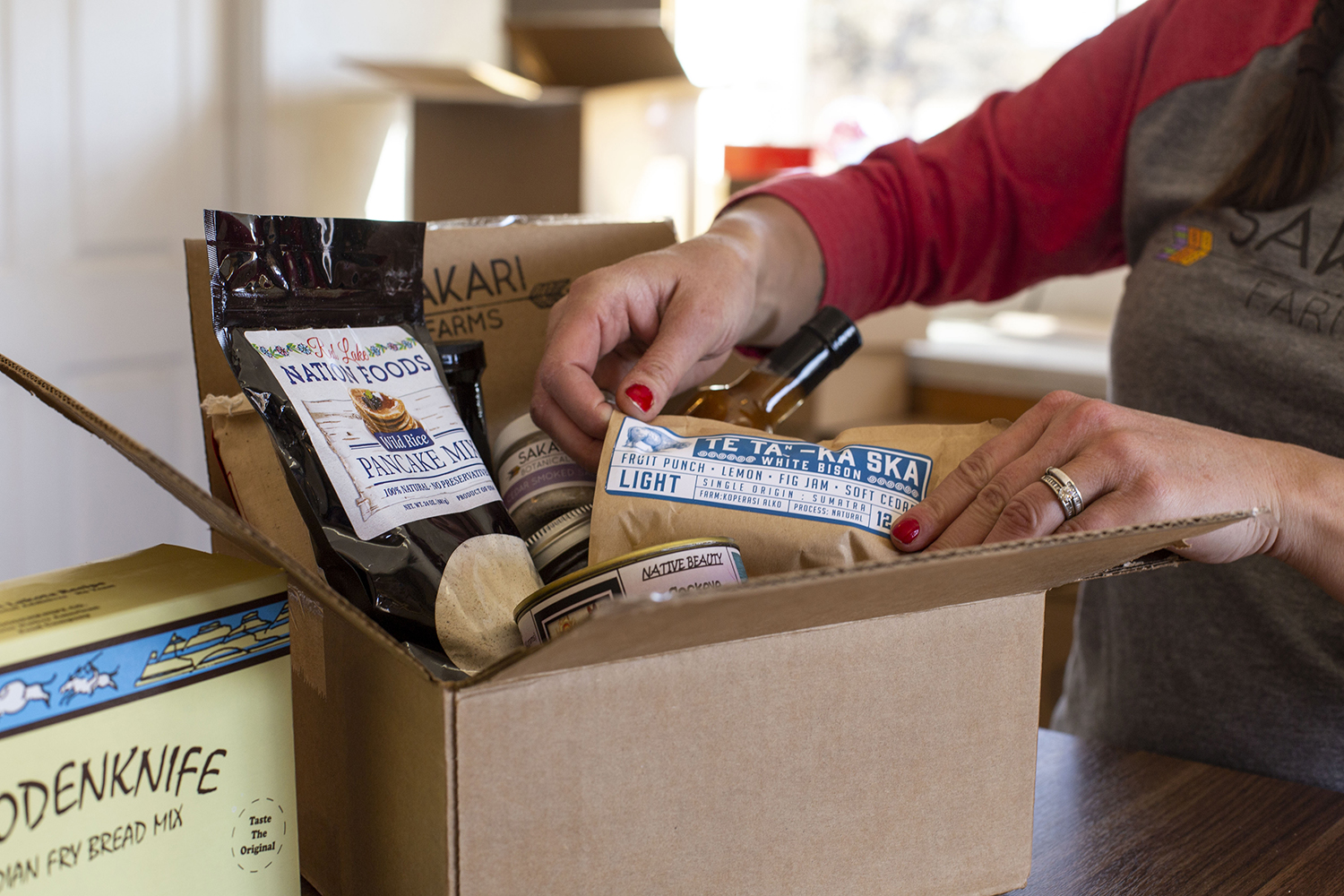NextGenRadio
Native American Journalists Association Newsroom
Finding, coaching and training public media’s next generation.
“In the Time of COVID-19”
As the pandemic continues to lay bare social inequalities like access to fresh foods, Spring Alaska Schreiner finds an alternative way to feed her community through tribal food boxes full of nutritious Indigenous foods.
Illustration by Emily Whang
Feeding family: Nourishing Indigenous communities during the pandemic
Spring Alaska Schreiner spends her days on Sakari Farms tending to the Indigenous plants and foods she grows. The farm rests on a six-acre plot in the Oregon high desert where the Three Sisters volcanic peaks jut out of the landscape and into view.
As the owner and principal ecologist at Sakari Farms, Schreiner (Chugach Alaska Corporation and the Valdez Native Tribe) grows ancestral tribal seed for tribal food production, hosts educational tribal food events and cooking classes, and tends to her other business, Sakari Botanicals which incorporates plant material from the farm into hot sauces and teas. Although the pandemic has forced Schreiner to stop or curtail most of that, she found a way to stay in business and support her community.
Tending to and gathering traditional Indigenous foods is nothing new to Schreiner. Her childhood in Alaska was enriched with knowledge of food. Now, she’s using that know-how to put together food boxes filled with nutritional Indigenous foods, which they deliver to tribal communities across the Pacific Northwest region.
Listen to this story

In 2018, Sakari Farm was established to grow all Indigenous or ancestral plants and foods for tribal food production on a six acre farm in Tumalo, Ore. (Photo by Jessica Douglas)
“For people not living on a reservation, there really wasn’t any food around,” Schreiner said. “So I just chose to fill that demand.”
Her mother, a trained chef, came from a very large family, and growing up, Schreiner helped her farm extensive gardens that provided riches during times when her family experienced food insecurity.
“That’s where I learned, is watching her (garden),” Schreiner said. “So the need to constantly create new things, making a lot out of a little concept has always been around me.” Schreiner is also Inupiaq and grew up gathering berries and roots, and hunting and fishing in Alaska. She attended the University of Alaska Fairbanks where she studied psychology and natural resources, and became acquainted with other Alaska Native foods and traditions.
When Schreiner moved to Bend, Oregon in 2006, she started to notice there wasn’t a source for local Indigenous foods for tribal members within town. The closest reservation and potential access for traditional foods was more than an hour’s drive north to the Confederated Tribes of Warm Springs reservation in Warm Springs, Ore.
Schreiner sought to fill the niche desire for Indigenous foods in Central Oregon and in 2012, created Sakari Botanicals, the tribal food business which creates syrups, teas and salts. She operated out of a small site in the heart of downtown Bend, and grew all the plant materials necessary on her previous property, which was about a quarter acre plot of land.
“We were kind of forced to move with the market out here,” Schreiner said. “We ended up buying farmland and then it became Sakari Farms, and that gave us the ability to grow more food, host educational events. That’s when we knew it was time to really pick it up.”
On the new property, which houses four, 100-foot greenhouses, Schreiner started teaching gardening and cooking, and hosting tribal education classes. She wanted Sakari Farms to be a local Indigenous hub for farming and food production. However, the pandemic forced Schreiner to put a stop to all tribal classes and gatherings.
As the pandemic continued and laid bare social inequities like access to local and fresh foods, Schreiner knew access to locals foods would be difficult for many communities. On her own and partnering with The Wave Foundation, a non-profit organization focused on access to food, Schreiner began putting together tribal food boxes filled with foods from her own farm, as well as foods from Indigenous owned farms or producers across the country.
A tribal food box can vary depending on which other farms choose to participate each round of distribution, but a typical box might include smoked salmon from the Columbia river, Tanka bars (buffalo meat mixed with dried berries), wild rice, smoked cedar salt, beans, elderberry tea and syrup. Also included in each tribal food box are sweetgrass braids or cedar bundles for ceremonial purposes.
“There’s more tribal people getting access to tribal foods,” said Schreiner. “So it’s been really beneficial because it’s food, and everyone needs food right now too.“

Spring Alaska Schreiner (Chugach Alaska Corporation and the Valdez Native Tribe) is the owner and principal ecologist at Sakari Farms, where she also hosts educational tribal food events and cooking classes, and tends to her other business, Sakari Botanicals, which incorporates plant material from the farm into hot sauces and teas. (Photo by Jessica Douglas)

Claudia Gutierrez, a farm assistant, holds a lettuce seedling before planting the sprout in one of the four 100-foot greenhouse at Sakari Farms. (Photo by Jessica Douglas)
While the pandemic has impacted Schreiner’s business and her personal life — Schreiner recently lost her grandmother to COVID-19 — she believes feeding her community and providing nutrient rich Indigenous foods is a top priority. For Schreiner, it is important that everyone has access to food, especially elders who tend to be most vulnerable to COVID-19.
“We’re feeding more people and so I think it’s been a benefit for those elders who have not been feeling well or passing to be able to give them these high nutritional value products,” Schreiner said. “I know that they’re making those old associations with those smells and tastes that will help kind of bring back some youth and like younger times — the tastes, smells, memories, memories of gathering, memories of sharing their language with their children.”

Schreiner assembles one of the tribal food boxes that Sakari Farm delivers to Indigenous communities across the region. (Photo by Jessica Douglas)
About NextGenRadio
The Next Generation Radio Project is a week-long digital journalism training project designed to give competitively selected participants, who are interested in radio and journalism, the skills and opportunity to report and produce their own multimedia story. Those chosen for the project are paired with a professional journalist who serves as their mentor.
This edition of the #NPRNextGenRadio project was produced in collaboration with the Native American Journalists Association in March 2021.
Acknowledgments
Managing Editors:
Jourdan Bennett-Begaye - Managing Editor, Indian Country Today, Washington, D.C.
Phyllis Fletcher - Senior Editor, American Public Media Studios, Seattle
Audio Engineer lead:
Selena Seay-Reynolds - Freelance audio engineer, Los Angeles/New Jersey, with Patrice Mondragon - Audio Tech, Colorado Public Radio
Visuals team lead:
Erica Lee - Freelance photojournalist, New Jersey, with Kevin Beaty of The Denverite and Colorado Public Radio, Denver
Illustration team lead:
Emily Whang - Freelance Illustrator, Los Angeles with Ard Su - Freelance Illustrator, Baltimore, and Lauren Ibañez - Freelance Illustrator, Houston
Digital Editors:
Manuelita Beck, Politics Now Editor, USA TODAY, Indianapolis
Alexis L. Richardson, Chief Innovation Officer & Digital Strategist, “The Mom Edit,” Philadelphia.
Web Developers/Producers:
Cameo Hill of NPR station KJZZ in Phoenix
Robert Boos of Metropolitan State in Saint Paul, Minnesota.
Our journalist/mentors for this project were:
Brian Bull - Reporter, KLCC, Eugene, OR
Carrie Jung - Education Reporter, WBUR, Boston
Graham Lee Brewer - Associate Editor for Indigenous Affairs, High Country News, Norman, OK
Savannah Maher - Rocky Mountain News Bureau, Indigenous Affairs Desk, KUNM, Albuquerque, NM
Christine Trudeau - High Country News, Contributing Editor to the Indigenous Affairs Desk, San Diego
NPR’s Next Generation Radio program is directed by its founder, Doug Mitchell.
